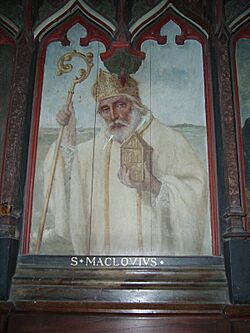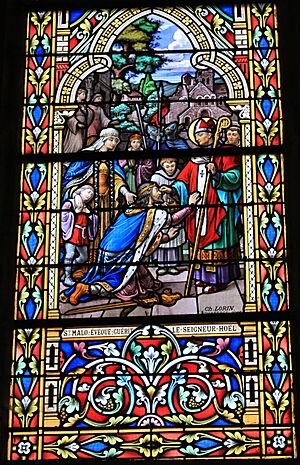Malo (saint) facts for kids
Quick facts for kids Saint Malo of Aleth |
|
|---|---|

Saint Malo
|
|
| Born | c. 27 March 520 Traditionally Llancarfan, Glywysing |
| Died | 15 November 621 (aged 101) Archambiac, Duchy of Aquitaine |
| Venerated in | Roman Catholic Church Eastern Orthodox Church |
| Major shrine | Saint-Malo Cathedral |
| Feast | 15 November |
| Attributes | Depicted as an abbot and a bishop |
| Patronage | Saint-Malo, pig-keepers, lost items |
Saint Malo, also known as Maclou, was an important Welsh saint. He lived a long time ago, from about 520 to 621 AD. He helped start the city of Saint-Malo in Brittany, France. Saint Malo is one of the seven founding saints of Brittany.
Contents
Early Life of Saint Malo
Saint Malo was likely born in a place called Llancarfan in Wales around the year 520. His name, Malo, might come from old Breton words. These words mean "warrant" or "hostage" and "brilliant" or "beautiful."
When he was very young, Malo was placed in the care of an abbot, a leader of a monastery. He grew up at the abbey, which is like a special religious community. There, he became a priest and was given the job of a preacher.
As a monk at Llancarfan Abbey in Wales, Malo was famous for joining Brendan the Navigator on his voyages. Malo became Brendan's favorite student and travel companion.
Many exciting stories tell of their adventures together. One tale says they discovered the "Island of the Blest." This was a legendary island, often described as a paradise. Another story tells of them meeting a giant named Maclovius. Brendan supposedly brought the giant back to life for a short time to baptize him.
On another trip, Brendan and Malo are said to have visited and taught people in many places. These included Cézembre, the Orkney Islands, and the northern islands of Scotland.
Saint Malo as a Breton Leader
After his travels, Malo settled in a place called Aleth. There, he worked with a wise old hermit named Aaron. When Aaron passed away in 544, Malo took over his spiritual duties. This area later became known as Saint-Malo.
Malo was then made the first Bishop of Aleth. Many amazing things are said to have happened because of him there.
Later in his life, the area became very troubled. This made Malo decide to leave. But the people soon missed him and begged him to come back. He agreed and returned to help bring peace and order again.
Feeling that his life was coming to an end, Malo wanted to spend his last days in quiet prayer. He died at a very old age while traveling from Aleth to Archambiac. This happened around November 15, 621.
Honoring Saint Malo
The city of Saint-Malo is a very important place for pilgrims. It is one of the seven stops on the Tro Breizh, which means "Tour of Brittany" in Breton. This is a special journey that celebrates the seven founding saints of Brittany.
Saint Malo's name also has a connection to the Falkland Islands. The Spanish name for these islands, Islas Malvinas, comes from the French name, Îles Malouines. This name was given in 1764 by Louis Antoine de Bougainville. He named them after the first known settlers, who were sailors and fishermen from the port of Saint-Malo.
Several churches and cathedrals are dedicated to Saint Malo. These include Pontoise Cathedral in France and Lesmahagow Priory in Scotland. Churches in Wales, like St. Maughans, Llanfaenor, and Llanfechell, also honor him. The place-name Saint-Maclou also refers to him.
See also
- Blessed Julian Maunoir, "Apostle of Brittany"
 | Aurelia Browder |
 | Nannie Helen Burroughs |
 | Michelle Alexander |


